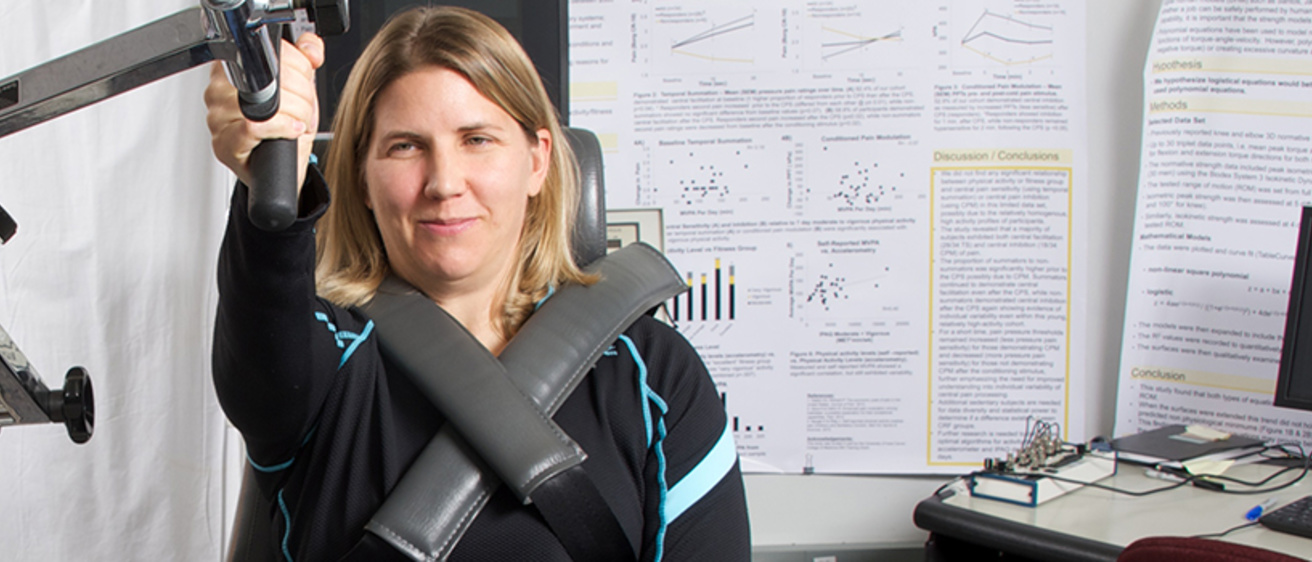Main navigation
Research Interests
Musculoskeletal Pain and Fatigue
- Experimental pain models in humans to investigate individual differences
- Sex-differences
- Personality
- Genetics
- Using intramuscular infusions, cold pressor task or muscle fatigue
- Factors contributing to fatigue differences
- Sex-differences
- Between-joint differences
- Joint Strength and Fatigue
- Modeling 3D strength surfaces
- Males vs. Females
- Strength percentiles
- Major joints: knee, elbow, shoulder, wrist, trunk, hip, ankle
- For digital human modeling application in collaboration with the Virtual Soldier Research Group and Center for Computer-aided Design
- Muscle activation strategies
- Muscle co-contraction during strength testing
- Modeling Fatigue
- Joint-level 3-compartment model< >Joint-specific modelsInternational Association for the Study of Pain (IASP, International Collaborative Research Grant)
- National Institutes of Health (NIH, K12, K01, NRSA for student)
- American Pain Society (APS, Future Leaders in Pain grant)
- Department of Defense (through Virtual Research Soldier, VSR, program)
- United States Council for Automotive Research (USCAR, subcontract through VSR)
- Foundation for Physical Therapy (graduate student support in lab)
- Carver College of Medicine (Carver Medical Research Initiative Grant)
- Modeling 3D strength surfaces
Funding Sources
Funding Sources
- International Association for the Study of Pain (IASP, International Collaborative Research Grant)
- National Institutes of Health (NIH, K12, K01, NRSA for student)
- American Pain Society (APS, Future Leaders in Pain grant)
- Department of Defense (through Virtual Research Soldier, VSR, program)
- United States Council for Automotive Research (USCAR, subcontract through VSR)
- Foundation for Physical Therapy (graduate student support in lab)
- Carver College of Medicine (Carver Medical Research Initiative Grant)
Resources
Resources
The Neuromuscular Biomechanics Laboratory is a newly renovated space (~600gsf) aimed at studying neuromuscular (e.g. muscle activation strategies, EMG, reflex responses) and biomechanical (e.g. motion and force production) aspects of human movement. Major equipment includes:
- Biodex System # with Researcher's Toolkit
- 16 channel Bagnoli-16 (Delsys, Inc.) surface EMG
- Digitimer DS7A stimulator
- 100 Hz digital camera (Basler A602f)
- Infusion pump
- pH meter
- Somedic Pressure Pain Algometer
- Labview, Matlab, and MaxTraq 2D software packages
- Dell Precision Workstation, with dual SATA hard-drives (RAID configured)
- National Instruments M-series DAQ
- Dell Latitude 600 laptop
- National Instruments E-series DAQcard for portable EMG

Laura Frey Law, PT, PhD
Director
